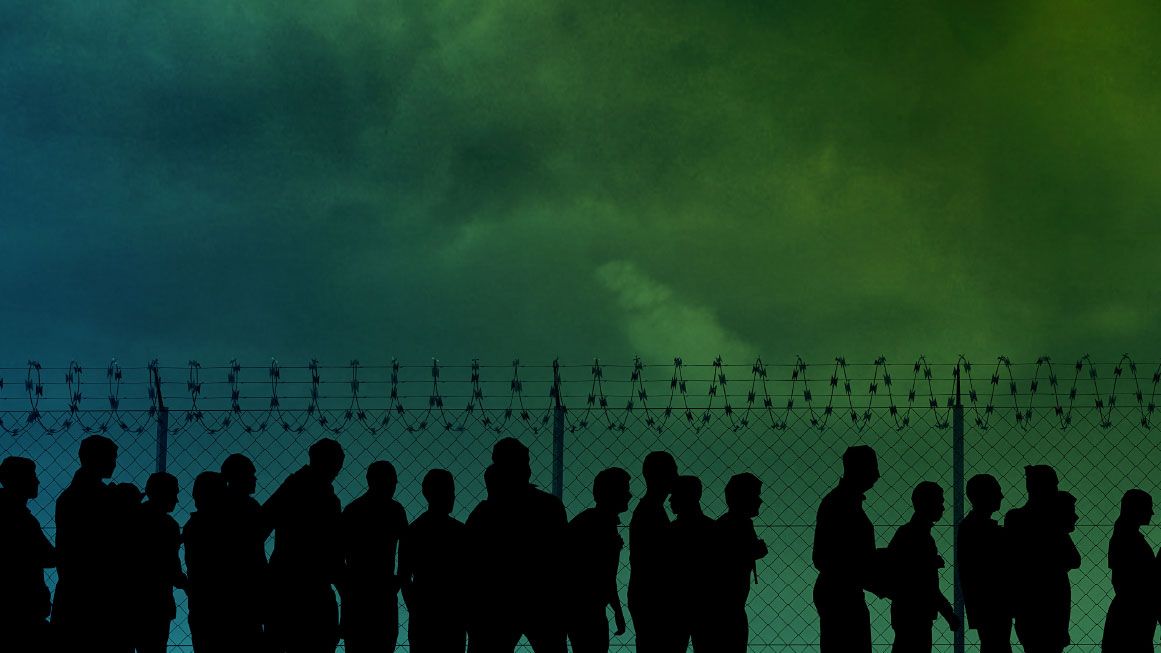Debate: Despite the Welfare State, the U.S. Should Open Its Borders
Can Americans afford to welcome the huddled masses?

'Immigrants Are Trespassers' Is a Socialist Argument
Affirmative: Bryan Caplan

Should you need government permission to take a job offer from a willing employer, rent an apartment from a willing landlord, or buy a product from a willing merchant? Most libertarians will rush to say, "No; these are basic human rights." Do all human beings have these rights? Most libertarians will rush to say, "Yes; we hold these truths to be self-evident."
If you snap these two answers together, they imply a policy of free immigration. If an American doesn't need government permission to take a job offer from an American, why should a Mexican need government permission to take such an offer? Yet today, many libertarians oppose free immigration. Plenty favor even stricter regulations than we already have.
What makes libertarians so open to immigration restrictions? Their favorite rationale comes straight from the late, great Milton Friedman. In a 1999 interview, he famously declared, "You cannot simultaneously have free immigration and a welfare state." Libertarians who support immigration restrictions have been quoting him ever since. But was he right?
Friedman plainly overstates. Suppose the welfare state gave everyone in the United States just $1 per year. Even if everyone on Earth moved here, that annual $8 billion would be only a little more than 0.1 percent of the federal budget. No matter how philosophically opposed to this handout you are, it would be foolish to insist that it "cannot" be done. The feasibility of combining free immigration with the welfare state is plainly a matter of degree. It depends on the benefits immigrants receive and the taxes they pay. It depends, in short, on math—math that almost everyone finds too boring to consider.
Fortunately, there are quants who do this boring math for a living, quants like the people who write reports for the National Academy of Sciences (NAS). While quants' answers vary, they don't vary that much. By NAS calculations, the average current immigrant to the U.S. is ultimately a net fiscal positive. When you split the sample up by education and age, high school dropouts and the elderly are net negatives but all other demographics are net positives.
How can the math be so benign? First, because immigrants' home countries often pay for most or all of their education, so U.S. taxpayers don't have to. Second, because immigrants tend to be young and therefore pay taxes for decades before they start collecting retirement benefits. Third, because much government spending (such as defense and debt service) does not depend on population. Immigrants who pay below-average taxes can still improve our fiscal outlook, just as moviegoers who buy discounted tickets can still improve a movie theater's profitability.
What if you tone down Friedman's hyperbole, and just say, "Open borders are probably fiscally feasible, but it's still in our interest to exclude all of the immigrants who are statistically expected to be a net burden"? Pragmatically, the obvious objection is: Why are you focused on excluding burdensome immigrants instead of limiting their access to benefits so they cease to be burdensome? Virtually every country already limits foreigners' access to benefits. The Gulf monarchies, with extremely strict limits, not coincidentally have the world's most open immigration policies. Why not emulate that?
The philosophical objection to excluding burdensome immigrants is even stronger. If government may justifiably forbid the entry of burdensome immigrants, may government also justifiably forbid the birth of burdensome natives? You need not be a math whiz to realize that the child of an unemployed mother and an imprisoned father is likely to be a burden on taxpayers. Should libertarians take this as a compelling reason for government to restrict the right to reproduce?
Libertarians famously oppose fairly mild infringements of personal freedom, such as mask requirements, vaccine mandates, gun bans, and motorcycle helmet laws. Why? Because libertarians hold government to high standards. When a law has bad effects, libertarians push for repeal, not another law to offset those bad effects. When governments restrict immigration, consistency requires libertarians to hold them to the same high standards—much higher, really, because denying someone the right to do business in the labor and housing markets is truly draconian.
But don't nations, like property owners, have the right to exclude outsiders? Since you can't move into my house without my permission, the argument goes, you shouldn't be allowed to move into our country without our permission. The implications here are totalitarian. The reasoning is exactly parallel to: You can't start a church in my house without my permission, therefore you shouldn't be allowed to start a church in our country without our permission. Or: You can't open a store in my house without my permission, therefore you shouldn't be allowed to open a store in our country without our permission.
The core of libertarianism is that a country belongs not to "the people" collectively, but to property owners individually. If and when the welfare state makes an immigrant a net negative, labeling the immigrant a "trespasser" may be convenient. But you have to be a socialist to really believe it.
Adding Tens of Millions of People Would Exacerbate America's Problems
Negative: Robert VerBruggen
The best way to understand the difficulty of open borders is simply to imagine it happening—not in the distant past when travel was difficult and the West was unsettled, but today.
Open borders wouldn't simply let in the several million people already waiting to come to the country legally, or drop all efforts to control the influx across the southern border. The policy would welcome anyone who wants to come, full stop, even if they would not have found it worthwhile under the current system to deal with the hassle of legal immigration or the hazards of illegal immigration.
Per Gallup's 2021 polling, about 900 million adults across the world would leave their countries if they could; about 160 million of these name the U.S. as their top destination. The desire to leave is strongest in some of the world's poorest nations, such as Sierra Leone and Honduras. A 2011 study by the pollster, based on earlier rounds of the same survey, found that 40 percent of would-be migrants to the U.S. had an elementary education or less.
Adding 160 million people would increase the U.S. population by close to half. To be sure, U.S. immigration policy is not the only obstacle these individuals face (so that estimate might be too high). And the number doesn't include kids, or folks who might come to the U.S. even though it's not their top choice (so it might also be too low). But the true number would, without a doubt, be huge.
Puerto Rico has open borders with the U.S. by virtue of being a U.S. territory. As of 2013, a third of living people born in Puerto Rico resided on the U.S. mainland. Including those born into the mainland Puerto Rican community, there has been a larger Puerto Rican population on the U.S. mainland than in Puerto Rico itself since the 2000s.
So imagine it: Our nation of 330 million finds itself committed to grow by some unpredictable but large fraction (a quarter, half, double, who knows?) over an equally unpredictable amount of time until the pent-up demand is satisfied, and then will accept elevated immigration levels afterward too.
Adding tens to hundreds of millions of immigrants, largely from poor nations, would have any number of effects. The newcomers could contribute great inventions, serve in our military, and introduce delicious cuisines; they could also bring with them the institutions, political beliefs, and cultures that made their home countries worth leaving, stress our housing and labor markets, and ignite ethnic conflict, both with each other and with U.S. natives.
Of all the downsides of open borders, the burden on the welfare state might not be the biggest. In theory it could even be one of the easier problems to address: Just ban immigrants from state support.
In practice, though, it's difficult to welcome millions of poor people without giving them some help. Witness the struggles of New York City to handle just 40,000 asylum seekers, who amount to roughly 0.5 percent of the city's 8.5 million population. Or contemplate millions of seniors without health care while homeless encampments grow in the nation's already-housing-starved cities. Further, thanks to the U.S. rule of "birthright citizenship," all children born to immigrants here are automatically citizens, which complicates any effort to exclude them from welfare programs.
An extensive 2017 study from the National Academies estimated that immigrants with a high school degree or less tend to cost the government more than they pay in taxes over a 75-year period. It also stressed that state and local governments are hardest hit in the near term thanks to the need to provide basic services such as education to a suddenly larger population, with many states losing thousands of dollars per first-generation immigrant on average. Research from the Migration Policy Institute shows that immigrant families are more likely than native ones to use safety-net programs.
An open-borders policy, beyond being unrealistic, represents an insane gamble with the stability of the most powerful nation on the planet. Those who want looser immigration laws should set their sights lower and calibrate their rhetoric to match.
Here's a different approach: Start with the easy cases, such as those with valuable skills and perhaps refugees as well, and try to push those numbers up. If you can show the public that higher numbers in these categories improve the country, they might be tempted to follow you further.
Subscribers have access to Reason's whole May 2023 issue now. These debates and the rest of the issue will be released throughout the month for everyone else. Consider subscribing today!
- Debate: It's Time for a National Divorce
- Debate: Artificial Intelligence Should Be Regulated
- Debate: Democracy Is the Worst Form of Government Except for All the Others
- Debate: To Preserve Individual Liberty, Government Must Affirmatively Intervene in the Culture War
- Debate: The E.U. Was a Mistake
- Debate: The U.S. Should Increase Funding for the Defense of Ukraine
- Debate: Mentally Ill Homeless People Must Be Locked Up for Public Safety
- Debate: Despite the Welfare State, the U.S. Should Open Its Borders
- Debate: Cats Are More Libertarian Than Dogs
- Debate: Make Housing Affordable by Abolishing Growth Boundaries, Not Ending Density Restrictions
- Debate: Bitcoin Is the Future of Free Exchange
- Debate: Be Optimistic About the World


Show Comments (144)